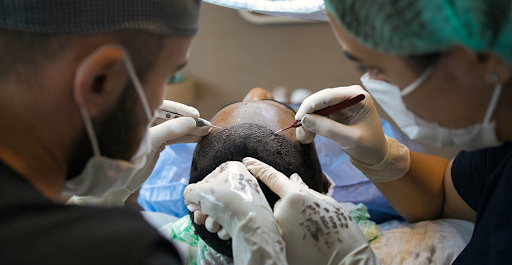Are you struggling with hair loss? This can be a daunting experience that can make you feel less confident and affect your quality of life. But the good news is that a hair transplant can help you regain your hair and confidence.
However, not all hair transplants are created equal. Success rates vary based on many factors. In this post, we’ll discuss what decides the success rate of a hair transplant, along with ways you can ensure a successful hair restoration procedure for yourself.
Table of Contents
Factors that Determine Hair Transplant Success Rate
1.Skill and Experience of the Surgeon
The success of any surgical procedure depends heavily on the skills and experience of the surgeon, as is the case in hair transplants. Therefore, it’s crucial to choose a qualified and experienced hair transplant surgeon who is skilled in the latest techniques and has a track record of successful procedures.
2.Type of Hair Transplant
FUT (Follicular Unit Transplantation) and FUE (Follicular Unit Extraction) are the two main types of transplant surgery. FUT is a traditional method that involves the removal of a skin strip from the back of the head, followed by the extraction of hair follicles from the strip. In contrast, FUE is the more modern approach.
Both methods can be successful, but the type of transplant you choose can affect your success rate. At TecniFUE Hair Clinic, the latest FUE technique is used, which gives you a look that feels more natural.
3.Adequate Donor Hair Supply
The availability of a donor’s hair is a significant factor in hair transplant success. Adequate donor hair is necessary to achieve a full and natural-looking head of hair. Your hair transplant surgeon will assess your donor hair supply before the surgery and determine if it’s sufficient for the procedure.
In some cases, if the donor hair supply is limited, the surgeon could suggest other alternatives, such as scalp micropigmentation, which can give the illusion of fuller hair.
4.The Condition of the Scalp and Hair
The condition of your scalp and hair can also affect the success rate of a hair transplant. If there exists an underlying scalp condition such as alopecia, it affects the healing process and the success of the hair transplant. Similarly, if you have weak hair follicles or suffer from hair loss due to genetics or hormonal imbalances, it can also impact the success rate of the hair transplant.
Before the surgery, your hair transplant surgeon will assess the condition of your scalp and hair to ensure the best possible outcome.
5.Aftercare and Maintenance
Aftercare and maintenance are crucial in determining the success of your hair transplant. Following the surgery, it’s essential to take proper care of your scalp and hair to promote healing and prevent infection. Your surgeon will share post-operative care instructions and medications that will aid in the healing process.
Additionally, it’s important to keep up a healthy lifestyle in terms of diet and exercise to prevent the return of hair loss.
What does the procedure entail at TecniFUE Hair Clinic in Istanbul?
At TecniFUE Hair Clinic in Istanbul, the latest FUE technique is used, in which the individual hair follicles are taken out from the donor area, followed by their transplantation into the bald or thinning area. The best FUE hair transplant technique is minimally invasive and leaves no visible scarring, resulting in a more natural-looking outcome.
To ensure a successful hair transplant, the surgeons at TecniFUE Hair Clinic will first assess your hair loss and determine the best approach to achieve the desired outcome. They will examine the donor area to ensure an adequate supply of healthy hair follicles and assess the condition of the scalp and hair. If there are any underlying scalp conditions or weak hair follicles, they will discuss possible alternatives and tailor the procedure to your individual needs.
During the hair transplant surgery, you will be under local anesthesia, which prevents the sensation of pain. The surgeon will carefully extract individual donor hair follicles and implant them into your scalp where there is thinning or balding. The procedure usually takes a few hours to complete, depending on the extent of the hair loss.

After the surgery, you will be provided with post-operative care instructions and medications to ensure proper healing and prevent infection. You might feel swelling or discomfort at first, but it will go away in a few days. You should avoid intense physical activity for a few weeks after the surgery to allow for proper healing.
It’s important to note that while hair transplant surgery is an effective way to restore your hair, it’s not a cure for hair loss. You may require additional procedures in the future to maintain your desired level of hair density. However, with proper aftercare and maintenance, you can enjoy the results of your hair transplant services for many years to come.
Schedule a Consultation with the Hair transplant experts at TecniFUE Hair Clinic in Istanbul
If you’re struggling with hair loss, don’t let it affect your quality of life. Contact TecniFUE Hair Clinic in Istanbul today to book an appointment with experienced hair transplant surgeons. The facility prides itself on delivering exceptional care to patients through the procedure and support with aftercare.
Book an initial consultation today!

